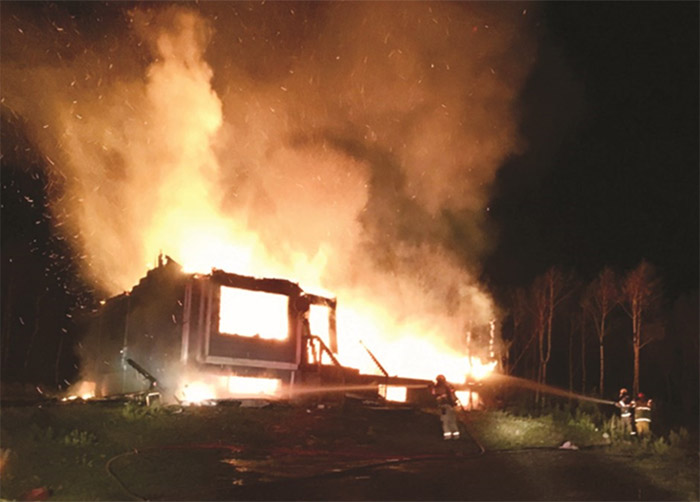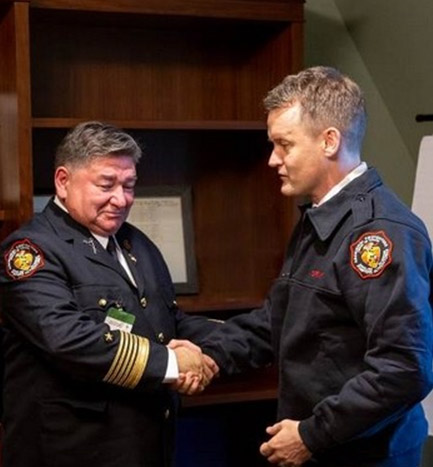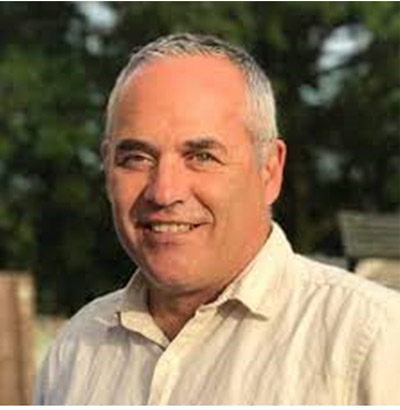|
|

|
  
Features
Update 2021/1/17
First Nation
INDIGENOUS FIRE MARSHAL OFFICE TAKES A PAN-CANADIAN APPROACH TO SAFETY
By Suzanne Forcese
A study by the Canada Mortgage and Housing Corporation (CMHC) found that fire incidences in First Nations Communities were more than twice that for the rest of Canada and that the fatality rate from fires was more than 10 times greater than the national average.

With 2 fire trucks and 3 volunteer firefighters, the Stoney Nakoda Fire Department in Alberta struggles to adequately cover a population of 3700 spread over 445 sq km
In 2019, the Minister of Indigenous Services announced funding of $9.9 million over 3 years to support the creation of an Indigenous Fire Marshal Office (IFMO).
The IFMO is an Indigenous-led organization working in collaboration with existing organizations and fire departments to serve Indigenous communities with the tools to promote safe communities through fire protection and capacity building.
WATERTODAY had the pleasure of speaking with Arnold Lazare, President of the Aboriginal Firefighters Association of Canada (AFAC) and the IFMO Project Lead.
“I’ve advocated for the past 30 years for change in the fire safety makeup of First Nations,” Lazare told us. “In the last two years I’ve been engaged with firefighters across Canada, people in leadership, and everyday people. I had a good idea what was required.”
Lazare, who is from Kahnawake Mohawk Territory, and is a certified instructor with the École Nationale des Pompiers du Québec and the Justice Institute of British Columbia, says he is pleased to see the Government support the creation of an IFMO. “We welcome the proposed investments to strengthen the capacity of Indigenous communities to prepare for and respond to emergencies. We will continue to work with Government, Indigenous communities, and key partners to improve life safety and protection of people, property and the environment.”
In his career he has been driven by the need to improve fire prevention, fire safety and emergency planning for First Nations.
“My goal is to build local capacity.”

Arnold Lazare, President of the Aboriginal Firefighters Association of Canada (AFAC), and IFMO Project Lead with Minister Seamus O’Reagan (Photo Indigenous Services Canada)
“Proper fire education and protection can mean the difference between life and death,”
The Hon, Seamus O’Reagan
According to a 2018 report of the standing committee on Indigenous and Northern affairs, the federal government has no current data on the number of fatal fires in Indigenous communities. Data collection ceased in 2010.
Lazare and his team are looking at program delivery. The first step of the program deals with fire department assessment.
“There are 630 First Nation communities in Canada. Not all have a fire department. We have started collecting data, identifying which communities do not have a fire department, which are served by mutual aid, and to determine a standard.
“This snapshot of communities across Canada gives us data to plan our resources.”
WATERTODAY also had the pleasure of speaking with Blaine Wiggins, executive director of the Aboriginal Firefighters Association of Canada.
Wiggins, from the Bay of Quinte Mohawks in Ontario whose extensive fire service credentials include a Masters Degree in Justice and Public Safety, told us that AFAC is in the midst of transitioning to the new IFMO platform.

Blaine Wiggins Executive Director
“We are switching over from our non-profit AFAC to National indigenous Fire Safety and in the midst of developing more of a pan-global network involving Inuit and Métis communities. By next year we expect to morph into structure, governance and policy.”
Wiggins says, “The biggest difference between AFAC and IFMO is that we will have a much wider focus with collaboration between different existing fire marshals. This is something that has never happened before. IFMO will provide the forum for everyone to work together.”
Up until now there has been no fire prevention act for Indigenous communities. That means there is no standardized process to meet any kind of fire safety requirements.
“Some communities have well-established rules around fire prevention while others have almost none.” The forum on IFMO will provide a uniform set of guiding principles.
National incidence reports, extensive research on mortality and morbidity rates, identifying risks, and improving response times will be included in the research instrument Wiggins is developing with the team.
“Our website outlines our programs,” Lazare adds.
Programs are being developed for delivery in 7 areas:
- Community Safety Education
- Governance (Fire Service)
- Community Infrastructure and Engineering Support
- Fire Department Management
- Fire Inspections
- Fire Investigations
- Fire Department Operations
The National Indigenous Fire Safety Council’s final goal is to have all programs available for delivery in 3 formats:
- Delivered in person by the Indigenous Fire Marshal Service (IFMS)
- Training provided by the IFMS in a Train the Trainer format
- Self-driven training with provided materials
Fire Safety Tips on the website include cooking safety, heating safety, electrical safety, woodstove and wood-burning fireplace safety, smoke alarms, escape planning and escape practice.
There are even teacher tools available, including a poster contest kit.
Lazare acknowledges the project requires help from everyone. “We have a lot of partners. We are very fortunate.”
suzanne.f@watertoday.ca
|
|
|
Have a question? Give us a call 613-501-0175
All rights reserved 2025 - WATERTODAY - This material may not be reproduced in whole or in part and may not be distributed,
publicly performed, proxy cached or otherwise used, except with express permission.
|
| |